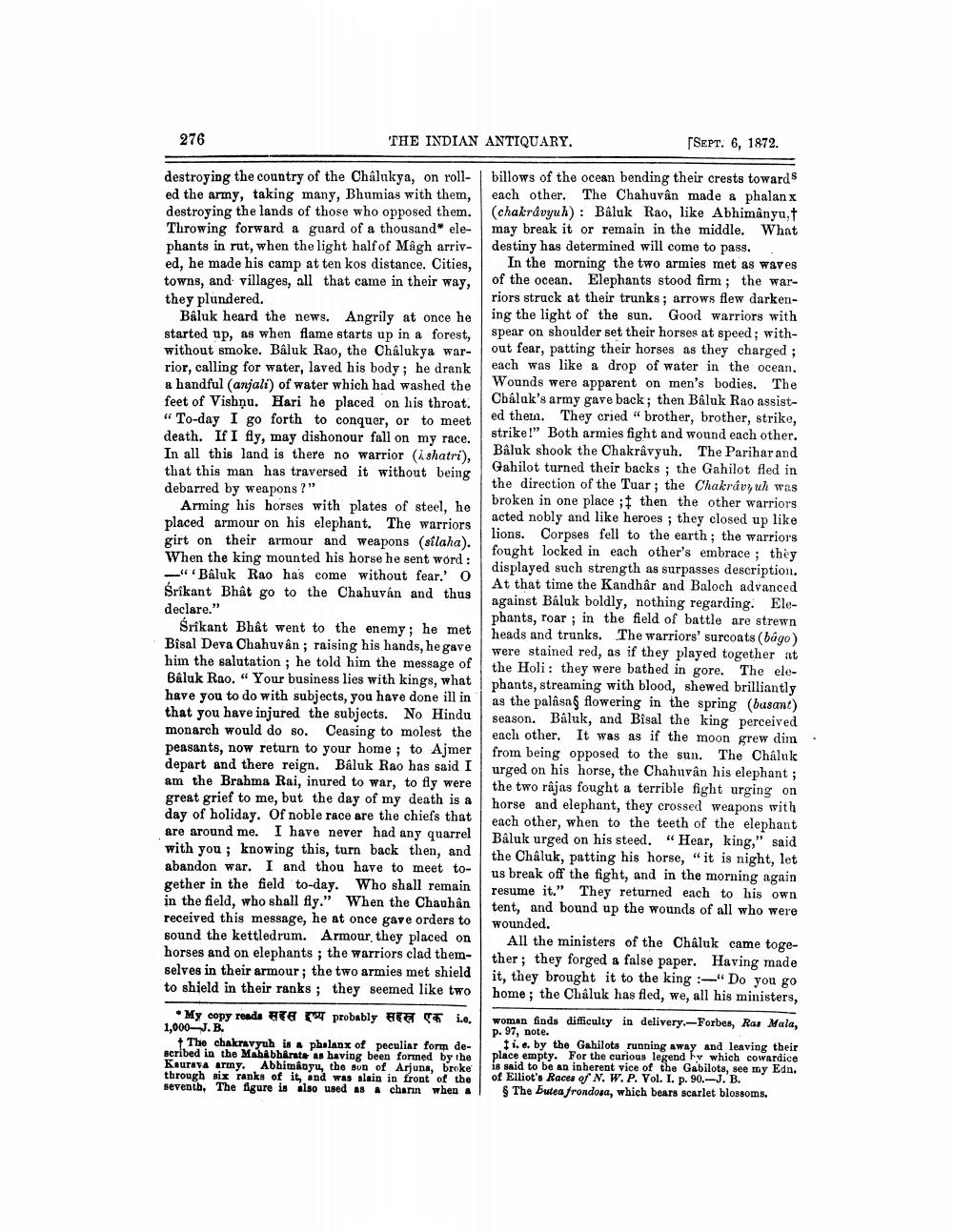________________
276
THE INDIAN ANTIQUARY.
SEPT. 6, 1872.
destroying the country of the Chalukya, on roll- ed the army, taking many, Bhumias with them, destroying the lands of those who opposed them. Throwing forward a guard of a thousand" ele- phants in rut, when the light half of Magh arrived, he made his camp at ten kos distance. Cities, towns, and villages, all that came in their way, they plundered.
Bâluk heard the news. Angrily at once he started up, as when flame starts up in a forest, without smoke. Baluk Rao, the Chalukya war- rior, calling for water, laved his body; he drank a handful (anjali) of water which had washed the feet of Vishņu. Hari he placed on his throat. “To-day I go forth to conquer, or to meet death. If I fly, may dishonour fall on my race. In all this land is there no warrior (ishatri), that this man has traversed it without being debarred by weapons ?"
Arming his horses with plates of steel, he placed armour on his elephant. The warriors girt on their armour and weapons (silaha). When the king mounted his horse he sent word: -"Báluk Rao has come without fear. O Śrikant Bhật go to the Chahuvan and thus declare."
Srikant Bhât went to the enemy; he met Bisal Deva Chahuvân ; raising his hands, he gave him the salutation; he told him the message of Bâluk Rao. “ Your business lies with kings, what have you to do with subjects, you have done ill in that you have injured the subjects. No Hindu monarch would do so. Ceasing to molest the peasants, now return to your home; to Ajmer depart and there reign. Bâluk Rao has said I am the Brahma Rai, inured to war, to fly were great grief to me, but the day of my death is a day of holiday. Of noble race are the chiefs that are around me. I have never had any quarrel with you ; knowing this, turn back then, and abandon war. I and thou have to meet together in the field to-day. Who shall remain in the field, who shall fly." When the Chauhan received this message, he at once gave orders to sound the kettledrum. Armour they placed on horses and on elephants ; the Warriors clad themselves in their armour; the two armies met shield to shield in their ranks; they seemed like two
•My copy read. सहस हष्य probably सहस्त्र एक . 1,000–J. B.
The chakravyuh is phalanx of peculiar form described in the Mahabharata as having been forned by the Kaurava army. Abhimanyu, the son of Arjuna, broke tbrough six ranks of it, and was slain in front of the seventb, The figure is also used as #cbarn when &
billows of the ocean bending their crests towards each other. The Chahuvân made & phalanx (chakrdvyuh) : Bâluk Rao, like Abhimanyu,t may break it or remain in the middle. What destiny has determined will come to pass.
In the morning the two armies met as waves of the ocean. Elephants stood firm ; the warriors struck at their trunks; arrows flew darkening the light of the sun. Good warriors with spear on shoulder set their horses at speed; without fear, patting their horses as they charged ; each was like a drop of water in the ocean. Wounds were apparent on men's bodies. The Cbálok's army gave back; then Baluk Rao assisted ther. They cried " brother, brother, strike, strike!" Both armies fight and wound each other. Baluk shook the Chakravyuh. The Parihar and Gahilot turned their backs; the Gahilot fled in the direction of the Tuar; the Chakravyuh was broken in one place it then the other warriors acted nobly and like heroes; they closed up like lions. Corpses fell to the earth; the warriors fought locked in each other's embrace; they displayed such strength as surpasses description. At that time the Kandhar and Baloch advanced against Báluk boldly, nothing regarding. Elephants, roar; in the field of battle are strewn heads and trunks. The warriors' surcoats (bago) were stained red, as if they played together at the Holi: they were bathed in gore. The elephants, streaming with blood, shewed brilliantly as the palasa flowering in the spring (busant) season. Bâluk, and Bisal the king perceived each other. It was as if the moon grew dim from being opposed to the sun. The Chaluk urged on his horse, the Chahuvân his elephant ; the two râjas fought a terrible fight urging on horse and elephant, they crossed weapons with each other, when to the teeth of the elephant Bâluk urged on his steed. “Hear, king," said the Châluk, patting his horse, “it is night, let us break off the fight, and in the morning again resume it." They returned each to his own tent, and bound up the wounds of all who were wounded.
All the ministers of the Châluk came together; they forged a false paper. Having made it, they brought it to the king "Do you go home; the Châluk has fled, we, all his ministers,
woman finds difficulty in delivery.-Forbes, Ras Mala, p. 97, note.
ti.e. by the Gahilots running away and leaving their place empty. For the curious legend by which cowardice is said to be an inherent vice of the Gabilota, see my Edn. of Elliot's Races of N. W. P. Vol. I. p. 90.-J. B.
The buleafrondosa, which bears scarlet blossoms.




